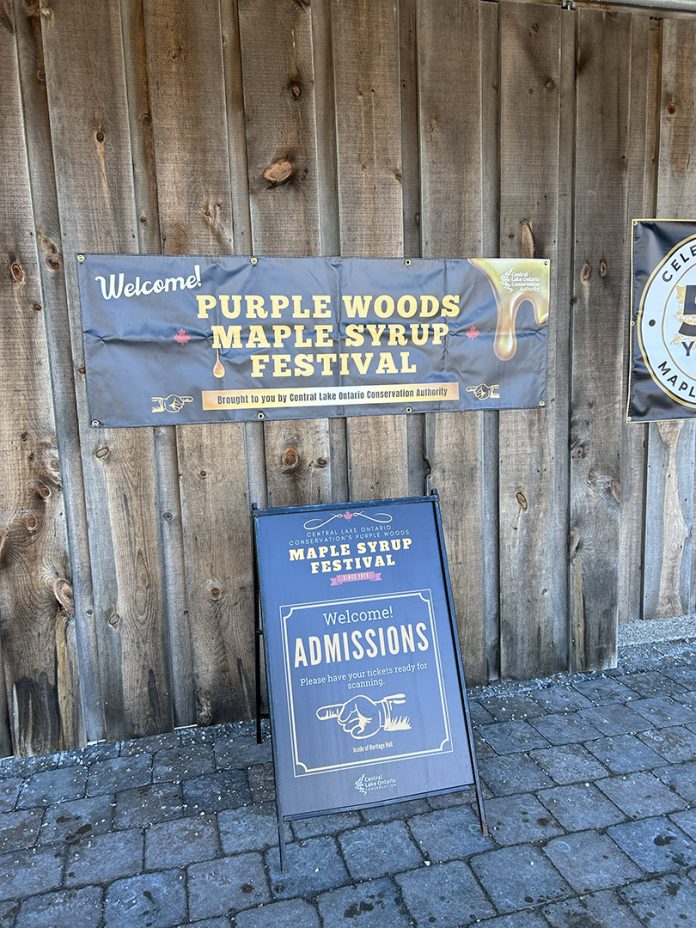Purple Woods recently celebrated 50 years of maple syrup production with a festival that highlighted its commitment to sustainability, community collaboration and environmental stewardship. The festival continues to draw thousands, offering not just a taste of fresh syrup, but also a closer look at local conservation efforts.
Yvonne Storm, the special events coordinator at Purple Woods, oversees two of the largest corporate events from the Central Lake Ontario Conservation Authority (CLOCA), including the Purple Woods Maple Syrup Festival and the Durham Children’s Watershed Festival.
“My job involves everything from grant writing and recruiting staff, to co-ordinating the various community groups and volunteers who help make these events possible,” she said.
The festival runs over 12 days and draws an estimated 10,000 visitors. Planning for the event begins six months in advance, including securing funding, hiring seasonal staff and organizing the vital pancake program where local not-for-profit groups volunteer their time.
“There’s a huge team effort involved, and it’s incredibly rewarding to see everything come together,” she said.
As an environmental non-profit, CLOCA relies on partnerships and funding support to continue offering programs that benefit the local community and the environment. “We’re always looking to make the festival a learning opportunity, not just for attendees, but for those involved,” she said.
In addition to its local environmental initiatives, the Purple Woods Maple Syrup Festival exemplifies how community engagement and sustainability can work together. Isabel Savransky, sustainability and asset planner from Ontario Tech University, explained how important it is for both students and staff to actively participate in environmental education. She emphasized that fostering hands-on local action is key to addressing the climate crisis.
“We actively promote the importance of environmental education, regardless of what program students are studying in or what department staff work in. Everyone has a part in the solution to the climate crisis, and we need more hands-on local action to stimulate global impact,” said Savransky.
For Sustainability Month, Ontario Tech hosted a variety of events, including Seedy Wednesday, which highlighted sustainable gardening, local food systems and environmental stewardship. Participants had the chance to swap seeds, plant new ones and learn about seed sovereignty. Other events contributed to the celebration of sustainability on campus like Sustainability Fest and the Campus Farm Walk, where students learned about sustainable farming practices, witnessed ongoing environmental projects and engaged with experts in the field.
To organize these events, Ontario Tech works with a variety of campus departments and neighbourhood organizations, including Durham Region, Little Forests Durham, Climate Justice Durham and the Faculty of Social Science and Humanities.
Staff are often able to stop by events during their lunch hours, and students can easily participate between classes, making it easy for everyone to engage in the environmental efforts.
Sustainability is not just a buzzword at Purple Woods; it’s woven into the fabric of the event. From the use of recycled materials in the construction of the buildings, to water conservation practices, the festival is designed with a light footprint in mind.
“We harvest rainwater for fire suppression and use gray water for flushing toilets,” said Storm. “The building itself is made of recycled materials, including materials from old Air Force hangars, which is a great example of how we integrate sustainability into everything we do.”
Purple Woods sits atop the Oak Ridge Moraine, a vital area for local drinking water sources. “The moraine acts as a natural filter for the water we rely on, and the conservation efforts we practice here help protect that water source,” said Storm.
This setting offers visitors insight into how protecting biodiversity and water sources contributes to a healthier ecosystem.
The festival also plays a role in mentoring future environmental stewards. Many of the seasonal staff are high school students interested in conservation or environmental sciences. “We hire students from local schools, and if they show strong interest and commitment, we often bring them on as summer staff, giving them a chance to continue working in conservation,” said Storm.
“It’s amazing to see how much passion these students have, and it’s a reminder that we’re building the next generation of environmental leaders.”
For Storm, the best part of the festival is seeing families come together to celebrate nature. “It’s the highlight of my year – seeing the little ones stomping in the mud puddles, which, believe it or not, is actually the perfect condition for making syrup. It’s a great way to remind everyone that you can’t make syrup without mud.”
The festival continues to draw visitors of all ages, sparking both fond memories and new experiences. “The sense of community here is incredible, and that’s what keeps people coming back. It’s more than just a festival – it’s an opportunity to reconnect with nature, learn about sustainability and share in a tradition that’s been passed down for generations,” said Storm.
As the Purple Woods Maple Syrup Festival celebrates its 50th anniversary this year, it remains a beacon of local conservation, environmental education and community spirit. With a focus on sustainability, education and inclusivity, Purple Woods serves as a reminder of how small actions, like collecting sap from a tree or recycling materials, can have a big impact on the environment.
When asked what keeps her coming back year after year, Storm reflected: “It’s the people and the impact we have on the community. We’re not just making syrup; we’re creating a space where people can learn, connect with nature and understand why conservation is so important.”




